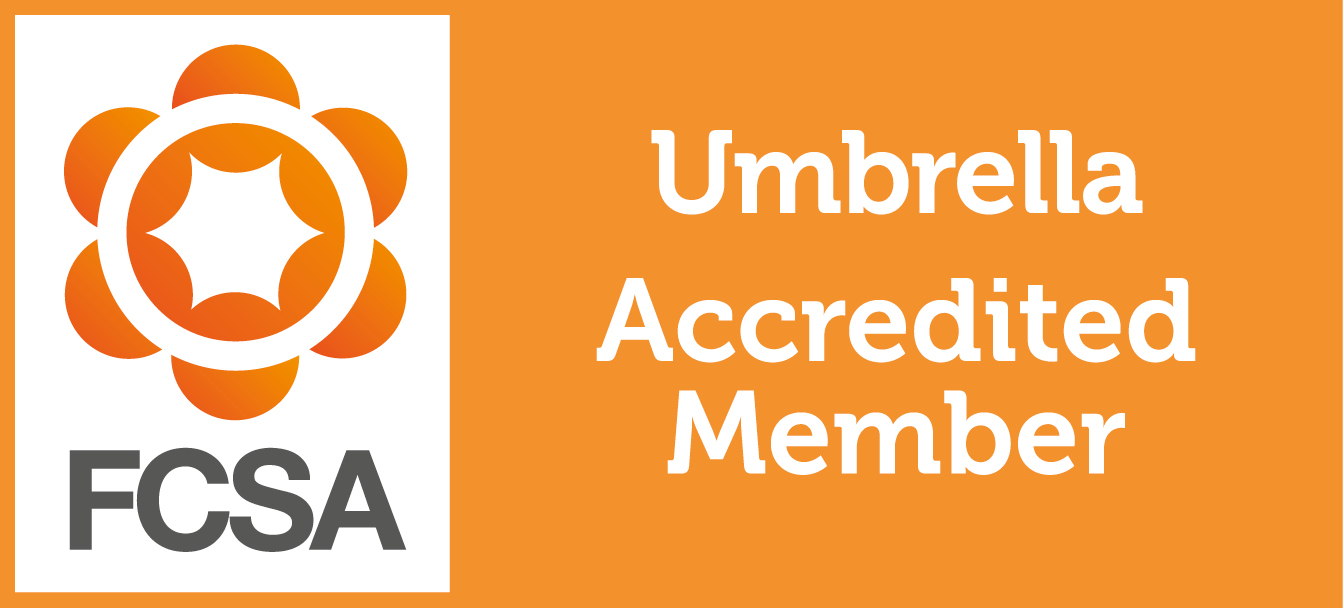
When you use an umbrella company, you’ll receive a payslip every time you are paid, outlining the deductions made to your assignment rate, including tax and National Insurance Contributions. This article provides a detailed overview of all the deductions you may see on your payslip, including what they are, why they occur and how much they are likely to be.
Umbrella company payslips
Just like an employee in a permanent role, your umbrella company is legally required to issue you a payslip every time they process your payroll (usually every week, unless your payment frequency is different). We have listed all the deductions you should expect to see on your payslip – assuming a compliant umbrella company is paying you.
Before you join an umbrella and await your first payment, you must ensure you have provided your umbrella with a P45 document, which your previous employer (or previous umbrella company) should have issued to you. Your new umbrella company will use your P45 to ensure that you are put on the correct tax code, which is necessary for you to be paid correctly (and to remove the risk of being emergency taxed). If you have not been issued a P45, chase your previous employer. If you are still unable to source a P45 – don’t panic. Your new umbrella company will ask you to complete a new worker checklist – a government document to help the umbrella identify your correct tax code.
Income tax
By joining an umbrella company, you become an employee. As a result, you are required to pay income tax and this will appear on your payslips. The rates of income tax (2023/24) are below:
| Band | Taxable Income | Tax rate |
| Personal Allowance | Up to £12,570 | 0% |
| Basic rate | £12,571 to £50,270 | 20% |
| Higher rate | £50,271 to £125,140 | 40% |
| Additional rate | Over £125,140 | 45% |
Employee’s National Insurance Contributions
As an employee, you will be required to pay Employee’s National Insurance Contributions and this will also appear on your payslip. Below are the current rates of Employee’s National Insurance Contributions (2023/24):
| Category letter* | £123 to £242 (£533 to £1,048 a month) | £242.01 to £967 (£1,048.01 to £4,189 a month) | Over £967 a week (£4,189 a month) |
| A | 0% | 12% | 2% |
| B | 0% | 5.85% | 2% |
| C | N/A | N/A | N/A |
| F | 0% | 12% | 2% |
| H | 0% | 12% | 2% |
| I | 0% | 5.85% | 2% |
| J | 0% | 2% | 2% |
| L | 0% | 2% | 2% |
| M | 0% | 12% | 2% |
| S | N/A | N/A | N/A |
| V | 0% | 12% | 2% |
| Z | 0% | 2% | 2% |
The employment costs (Employer’s National Insurance Contributions and the apprenticeship levy)
When you join an umbrella company, you’ll notice that your recruitment agency (or end client) will refer to your pay rate as the “assignment rate”. The assignment rate exists to consider umbrella payroll and is inflated to accustom for the employment costs, which are outlined below. While working for an umbrella company, the umbrella will pay you, but you will not be conducting any work for the umbrella (as you’ll be working for your end client). Therefore, this is why the employment costs are considered when the assignment rate is calculated, and you must understand this before joining an umbrella company and agreeing to an assignment rate with an agency.
Employer’s National Insurance Contributions
On your umbrella company payslip, you will notice the Employer’s National Insurance Contributions, usually listed underneath a section labelled the “employment costs”. The 2023/24 rates of Employer’s National Insurance Contributions are below.
| Category letter | £123 to £175 (£533 to £758 a month) | £175.01 to £481 (£758.01 to £2,083 a month) | £481.01 to £967 (£2,083.01 to £4,189 a month) | Over £967 a week (£4,189 a month) |
| A | 0% | 13.8% | 13.8% | 13.8% |
| B | 0% | 13.8% | 13.8% | 13.8% |
| C | 0% | 13.8% | 13.8% | 13.8% |
| F | 0% | 0% | 13.8% | 13.8% |
| H | 0% | 0% | 0% | 13.8% |
| I | 0% | 0% | 13.8% | 13.8% |
| J | 0% | 13.8% | 13.8% | 13.8% |
| L | 0% | 0% | 13.8% | 13.8% |
| M | 0% | 0% | 0% | 13.8% |
| S | 0% | 0% | 13.8% | 13.8% |
| V | 0% | 0% | 0% | 13.8% |
| Z | 0% | 0% | 0% | 13.8% |
The apprenticeship levy
The apprenticeship levy is also part of the employment costs and umbrella company employees will see this on their payslips. To help fund apprenticeship schemes throughout the UK, “the apprenticeship levy is paid by large employers with a pay bill of over £3 million” and “is an amount paid at a rate of 0.5% of an employer’s annual pay bill.” As umbrella companies process the payroll of hundreds, if not thousands of temporary workers, most are eligible to pay the apprenticeship levy.
For more information about the apprenticeship levy, please visit the government’s website.
Pension contributions
As your employer, umbrella companies are legally required to enrol all employees into a pension scheme within 12 weeks. However, you can opt-out once your first pension contribution has been made – if you prefer. Please speak with your umbrella company before registering to discover what pension provider is their preferred business. The minimum contribution set by the government that you and your employer can pay into your workplace pension is 8% – usually split into 3% employer and 5% employee. If you decide to continue contributing towards a pension, the two deductions will be listed on your payslip. The employer pension deductions will be deducted from the assignment rate and will appear on your payslip alongside the other employment costs (Employers NI and apprenticeship levy). The employee deductions will be shown alongside your personal tax deductions (PAYE income tax and Employees NIC).
A few umbrella companies offer salary sacrifice for pension contributions. Salary sacrifice will allow you to contribute greater amongst of your salary into a personal pension – in a tax-efficient manner.
Student loan repayments
If you are paying back a student loan, these deductions will appear on your umbrella company payslip. The thresholds are below:
| Plan type | Yearly threshold | Monthly threshold | Weekly threshold |
| Plan 1 | £22,015 | £1,834 | £423 |
| Plan 2 | £27,295 | £2,274 | £524 |
| Plan 4 | £27,660 | £2,305 | £532 |
| Plan 5 | £25,000 | £2,083 | £480 |
| Postgraduate Loan | £21,000 | £1,750 | £403 |
According to the government’s website, you will repay one of the following:
- 9% of your income over the threshold if you’re on Plan 1, 2, 4 or 5.
- 6% of your income over the threshold if you’re on a Postgraduate Loan plan.
Holiday pay
As an employer, umbrella companies are required to show holiday pay on your payslip. However, as you do not complete any work for the umbrella, the holiday pay allocation (25%) is deducted from your assignment rate.
Umbrella companies usually process holiday pay in two ways:
- They will include the holiday pay every time you are paid.
- Holiday pay will be accrued and paid in a lump sum at a later date.
Before you register with an umbrella, be sure to discuss holiday pay and how it is processed – to ensure you are entirely satisfied with your payroll.
The umbrella company’s margin
Every time an umbrella company processes your payroll, they deduct a margin from our assignment rate. The umbrella company’s margin is the only income it will generate for itself, with all other deductions going to HMRC (or a pension provider, for example).
Umbrella company margins vary between providers, but you should usually expect a weekly margin to be between £20 and £35. The margins are deducted from the gross amount, meaning that you essentially save on tax and pay less. However, beware of some umbrella companies who actually advertise a lower margin when it is actually deducted from your net salary (meaning it’s greater than it appears).
SafeRec
While most umbrella companies in the UK process payroll compliantly and in accordance with HMRC’s rules and regulations, a few have been accused of unscrupulous activity – such as deducting more than just their margin or failing to make the correct deductions. Therefore, it’s imperative that you conduct thorough due diligence when choosing your next umbrella company and only use one that is fully compliant.
The umbrella company sector remains unregulated by the government. However, the Freelancer and Contractor Services Association (FCSA) self-regulates the sector and issues accreditation to umbrella companies that prove they operate compliantly and adhere to the FCSA’s publicly visible Codes of Compliance.
While choosing an FCSA-accredited umbrella is a wise decision, a new certification has taken the sector by storm, provided by SafeRec.
SafeRec Certified Umbrella Companies issue their employees with a payslip audit every time they process an employee’s payroll. This level of transparency is revolutionary and will provide umbrella employees with complete peace of mind. Umbrella Company UK is a SafeRec Certified Umbrella Company. If you use our service, we will email you a payslip audit to support every payslip, and you can check that we have made all the legal deductions and that no unethical activity has occurred. We have always prioritised compliance, and our SafeRec certification allows us to prove to our employees that we are operating legitimately.
Umbrella Company UK
Founded by professionals with over 50 years of combined experience in the contractor payroll sector, Umbrella Company UK is a leading umbrella company committed to providing compliant payroll services for contractors and freelancers. We’re proud to be an FCSA accredited umbrella company, and we have recently become a SafeRec Certified Umbrella Company – the perfect combination to prove our dedication to providing the very best service in the industry.
Joining our umbrella service is easy, and our professionals are on hand to support you every step of the way. To request a free, tailored take-home pay calculation, please click here. Alternatively, you can request a call back for a convenient time or reach our friendly Sales Consultants by calling 01707 667023.
*A – All employees apart from those in groups B, C, H, J, M, V and Z in this table. B – Married women and widows entitled to pay reduced National Insurance. C – Employees over the State Pension age. H – Apprentices under 25. J – Employees who can defer National Insurance because they’re already paying it in another job. M – Employees under 21. V – Employees who are working in their first job since leaving the armed forces (veterans). Z – Employees under 21 who can defer National Insurance because they’re already paying it in another job.






